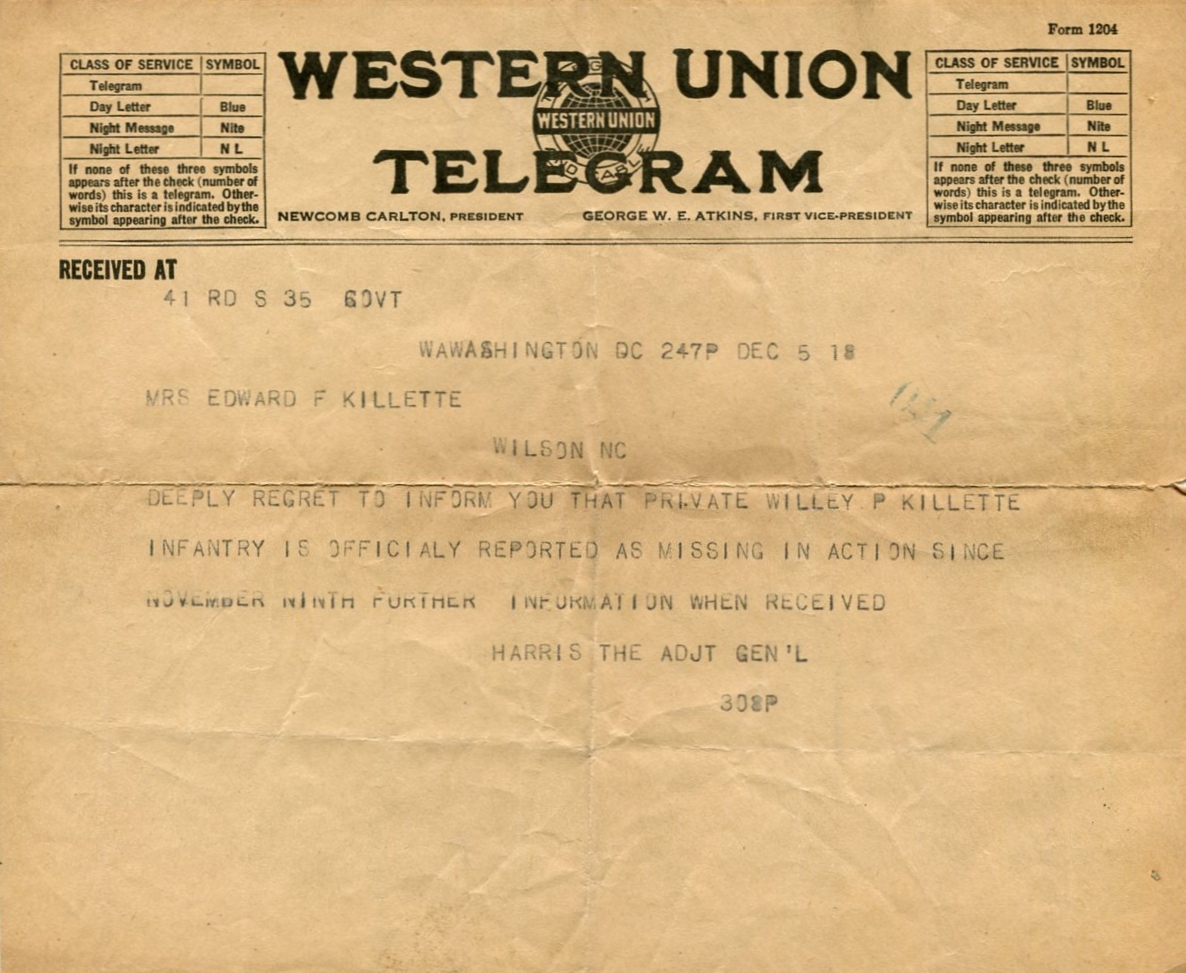Author: Matthew M. Peek, Military Collection Archivist
 Wiley Pearson Killette was born on July 8, 1896, in Wilson, N.C., to Edwin Franklin and Leanne (or Lou Anne) Elizabeth Pearson Killette. Wiley’s father Edwin was a general contractor and builder, who in 1915 was elected as mayor of the city of Wilson. Edwin F. Killette served as mayor from 1915 to 1919, and was re-elected in 1921, serving until his death in 1923. Edwin F. Killette Sr. was active in the Wilson fire department as a volunteer for thirty-one years, serving as the fire chief of Wilson starting in 1913. He served on the city council for ten years, and was president of the Wilson County Poultry Association.
Wiley Pearson Killette was born on July 8, 1896, in Wilson, N.C., to Edwin Franklin and Leanne (or Lou Anne) Elizabeth Pearson Killette. Wiley’s father Edwin was a general contractor and builder, who in 1915 was elected as mayor of the city of Wilson. Edwin F. Killette served as mayor from 1915 to 1919, and was re-elected in 1921, serving until his death in 1923. Edwin F. Killette Sr. was active in the Wilson fire department as a volunteer for thirty-one years, serving as the fire chief of Wilson starting in 1913. He served on the city council for ten years, and was president of the Wilson County Poultry Association.
On July 26, 1917, Wiley Killette unsuccessfully attempted to enlist in the U.S. Navy as a hospital apprentice second class at the Navy Recruiting Station in Norfolk, Virginia. At the time of his attempted enlistment, Wiley was working as a foreman for four years in Rocky Mount, North Carolina. Killette was inducted into military service for World War I in Wilson, N.C., on September 6, 1917.
He was assigned to Company H, 322nd Infantry, 81st Division, U.S. Army, and served in that unit until his discharge. Killette was stationed and/or trained at Camp Jackson in South Carolina; Camp Sevier in South Carolina; and Camp Upton on Long Island, N.Y. Wiley Killette sailed for overseas service in Europe on July 31, 1918.
Wiley Killette had an interesting experience with military ranks during his WWI service. When he first enlisted in the Army, Killette was a cook; eventually, he was promoted to sergeant, followed by a promotion to mess sergeant. Over an eighteen-day period in October 1918, Killette was appointed three different ranks: private, cook, and finally back to private. Wiley Killette left the war with the rank of private in the U.S. Army.

Wiley Killette served overseas until April 28, 1919. He served on the Verdun Front in eastern France in October 1918. On November 9, 1918, Killette was reported as missing in action, and telegrams and letters of notification were sent to his parents. The Killettes received a letter from Wiley, written on November 18, 1918, on American Red Cross stationery, notifying them that he had been slightly injured in the hip on the date he was reported missing in action. He had been hospitalized in Bordeaux, France, after sustaining the injury. In February 1919, Killette was hospitalized in Chaumont, Haute Marne, France, due to a chronic injury unrelated to the war. After returning to the United States in April 1919, Wiley Killette was honorably discharged at Camp Lee in Virginia on May 23, 1919.
After the war, Wiley Killette married Elsie Glenn Langley on May 10, 1920, in Edgecombe County, N.C. He went into private practice as a civil engineer, serving in that position until his death on February 17, 1951, in Wilson, N.C. Wiley Killette was buried in the Killette family plot in Maplewood Cemetery in Wilson.
 You can read Wiley Killette’s correspondence online through the WWI collection of the North Carolina Digital Collections, a joint effort of the State Archives of North Carolina and the State Library of North Carolina.
You can read Wiley Killette’s correspondence online through the WWI collection of the North Carolina Digital Collections, a joint effort of the State Archives of North Carolina and the State Library of North Carolina.
To learn more about Wiley Killette’s WWI service, check out the Wiley P. Killette Papers (WWI 27) in the WWI Papers of the Military Collection at the State Archives of North Carolina in Raleigh, N.C.
This blog post is part of the State Archives of North Carolina’s World War I Social Media Project, an effort to bring original WWI archival materials to the public through the North Carolina Department of Natural and Cultural Resources’ (NCDNCR) various social media platforms, in order to increase access to the items during the WWI centennial celebration by the state of North Carolina.
Between February 2017 and June 2019, the State Archives of North Carolina will be posting blog articles, Facebook posts, and Twitter posts, featuring WWI archival materials which are posted on the exact 100th anniversary of their creation during the war. Blog posts will feature interpretations of the content of WWI documents, photographs, diary entries, posters, and other records, including scans of the original archival materials, held by the State Archives of North Carolina, and will be featured in NCDNCR’s WWI centennial blog.

